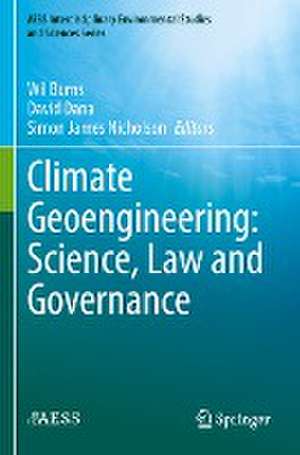Climate Geoengineering: Science, Law and Governance: AESS Interdisciplinary Environmental Studies and Sciences Series
Editat de Wil Burns, David Dana, Simon James Nicholsonen Limba Engleză Paperback – 6 noi 2022
This volume will explore scientific, political and legal issues associated with the emerging field of climate geoengineering. The volume encompasses perspectives on both of the major categories of climate geoengineering approaches, carbon dioxide removal and solar radiation management.
| Toate formatele și edițiile | Preț | Express |
|---|---|---|
| Paperback (1) | 943.25 lei 6-8 săpt. | |
| Springer International Publishing – 6 noi 2022 | 943.25 lei 6-8 săpt. | |
| Hardback (1) | 949.23 lei 6-8 săpt. | |
| Springer International Publishing – 6 noi 2021 | 949.23 lei 6-8 săpt. |
Preț: 943.25 lei
Preț vechi: 1150.31 lei
-18% Nou
Puncte Express: 1415
Preț estimativ în valută:
180.51€ • 196.01$ • 151.63£
180.51€ • 196.01$ • 151.63£
Carte tipărită la comandă
Livrare economică 22 aprilie-06 mai
Preluare comenzi: 021 569.72.76
Specificații
ISBN-13: 9783030723743
ISBN-10: 3030723747
Pagini: 262
Ilustrații: VI, 262 p. 13 illus., 11 illus. in color.
Dimensiuni: 155 x 235 mm
Greutate: 0.38 kg
Ediția:2021
Editura: Springer International Publishing
Colecția Springer
Seria AESS Interdisciplinary Environmental Studies and Sciences Series
Locul publicării:Cham, Switzerland
ISBN-10: 3030723747
Pagini: 262
Ilustrații: VI, 262 p. 13 illus., 11 illus. in color.
Dimensiuni: 155 x 235 mm
Greutate: 0.38 kg
Ediția:2021
Editura: Springer International Publishing
Colecția Springer
Seria AESS Interdisciplinary Environmental Studies and Sciences Series
Locul publicării:Cham, Switzerland
Cuprins
Chapter 1: Introduction.- Chapter 2: Characteristics of a solar geoengineering deployment: Considerations of governance.- Chapter 3: Climate Action: The Feasibility of Climate Intervention on a Global Scale.- Chapter 4: A Moral Framework for Commons-Based Geoengineering.- Chapter 5: A Human Rights Framework for Climate Engineering: A Response to the Limits of Cost-Benefit Analysis.- Chapter 6: The Role of Human Rights in Implementing CDR Geoengineering Options in South Africa.- Chapter 7: Geoengineering and the Question of Weakened Resolve.- Chapter 8: Using Renewable Energy Policies to Develop Carbon Dioxide Removal.- Chapter 9: Associate and Incremental Storage: Opportunities for Increased CO2 Removal with Enhanced Oil Recovery.- Chapter 10: Regulating Geoengineering: International Competition and Cooperation.- Chapter 11: Geoengineering and the Evolution of Dueling Precautions.
Notă biografică
Wil Burns serves as the Co-Director of Institute for Carbon Removal Law & Policy, a research institution in the School of International Service at American University. He is also currently a Visiting Professor in the Environmental Policy and Culture program.Simon Nicholson is an Associate Professor of International Relations in the School of International Service at American University. He is also Director of American University's Center for Environment, Community, and Equity, and co-Director of the Institute for Carbon Removal Law and Policy.
David Dana is the Kirkland & Ellis Professor of Law at Northwestern University’s Pritzker School of Law, and director of Northwestern’s Program on Animal and Food Law and Sustainability.
David Dana is the Kirkland & Ellis Professor of Law at Northwestern University’s Pritzker School of Law, and director of Northwestern’s Program on Animal and Food Law and Sustainability.
Textul de pe ultima copertă
The sobering reality of the disconnect between the resolve of the world community to effectively address climate change, and what actually needs to be done, has led to increasing impetus for consideration of a suite of approaches collectively known as “climate geoengineering,” or “climate engineering.” Indeed, the feckless response of the world community to climate change has transformed climate geoengineering from a fringe concept to a potentially mainstream policy option within the past decade.
This volume will explore scientific, political and legal issues associated with the emerging field of climate geoengineering. The volume encompasses perspectives on both of the major categories of climate geoengineering approaches, carbon dioxide removal and solar radiation management.
This volume will explore scientific, political and legal issues associated with the emerging field of climate geoengineering. The volume encompasses perspectives on both of the major categories of climate geoengineering approaches, carbon dioxide removal and solar radiation management.
Caracteristici
A focus on law and governance issues in the rapidly emerging field of climate geoengineering Updated assessment of the effectiveness of climate geoengineering Updated assessment of carbon capture and sequestration









